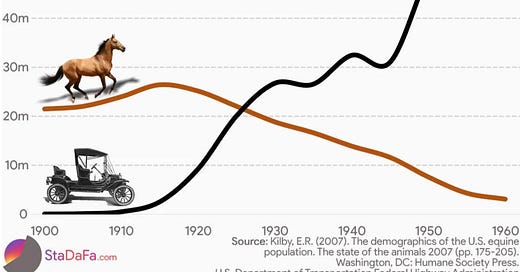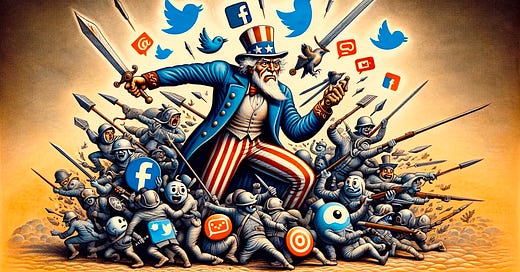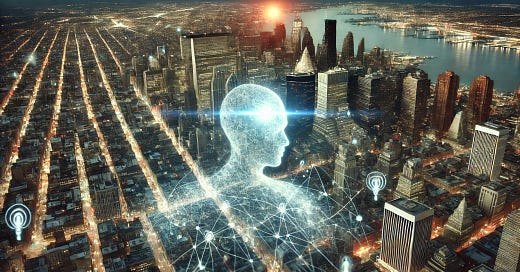
Horses in 1925 = Children in 2025
Getting people to have more children may be as difficult as getting people to abandon their four-door sedan for a horse and buggy.
I.
For people worried about AI taking everyone’s jobs, this chart or something very similar is what keeps them up at night. For thousands of years horses played a very important role in transportation, warfare and commerce. They were indispensable. People couldn’t imagine life without them. And then, over the course of a few decades they were entirely replaced by the automobile.
Sure, we still have horses, and people still ride them. But if you ignore matters of taste (carriage rides are romantic) and law (wilderness areas where vehicles aren’t allowed) there’s basically nothing a horse can do that a vehicle can’t do better.
For people worried about job loss due to AI, we’re the horses and AI is the automobile. Certainly it’s not hard to see the parallels, but many people contend that the analogy is flawed. Their contention is that AI will be similar to past technologies. As an example they may note that 99% of humans used to be farmers and now only 2% are. In other words technology never eliminates employment, it merely shifts it. From this they contend that AI will be no different.
Where do I fall? I think that AI will carry about the same impact as the internet, and in a shorter time frame, but that LLMs are not the path to AGI and superintelligence. As such I mostly think there won’t be massive AI driven unemployment, but only because I’m somewhat bearish on AI. But, if I’m wrong, and we do get AGI by September of 2027 (as a recent forecast claims) then it sure feels like we’ll quickly find ourselves in the position of horses.
This contention gains strength if I can point to another example of the “horse phenomenon”—Another time when something was eliminated by technological progress. As it turns out I believe I do have such an example, and this example is the true subject of my post.
This is not a post about AI. This is a post about children.
I recently went to the Natalism Convention in Austin Texas.1 One of the speakers at the conference was Catherine Pakaluk, author of Hannah's Children: The Stories of Women Quietly Defying the Birth Dearth. I was surprised to hear her also bring up the point about horses and cars, but rather than using it as an analogy for job loss and AI she used it as an analogy for children.
She contended that children in 2025 are like horses in 1925: That the core reason for declining fertility is because everything that was once done by children can be done better by something else.
This is a startling claim, and of course there’s obviously some chance that it’s simply not true, but the more I thought about it the more it helped to make sense of some of the more puzzling aspects of the fertility rate issues.
II.
Pakaluk mentioned three things children used to provide that are now provided elsewhere.
First, having children provides additional labor. This is particularly important when people are still farming, but as I already mentioned there’s not very many of those people left, and they’re almost certainly not farming by hand. These days, instead of being a net benefit, any discussion of children will mention how expensive they are. (Several speakers at the Natalism Convention pointed out they didn’t have to be so expensive, which is true, but a separate topic.) Most places cite a figure of around $300k to raise a child to 18. That’s a significant shift from an era when they were a net positive by the time they hit ten, i.e. they contributed more food than they consumed.
Second, having children gives you someone who will take care of you when you get old. This role has been taken over by the government—at least in theory. I wouldn’t say that the elder care provided by the government works as well as the care provided by one’s own children, but perhaps it’s close enough. Also at the point one is making the decision to have kids, the precise details of how one will be cared for decades hence may be fuzzy enough that the inadequacies of one form of care over another don’t much enter into it. It’s also possible that of the three items that having someone to care for you later in life is the smallest factor. Regardless, it’s something that has changed quite a bit over the last century.
The final point she brought up doesn’t directly involve something children provide, but despite that it may be the biggest point of all. It’s the issue of sex. It used to be that if you wanted to be “provided” with ongoing sexual pleasure, it was nearly inevitable that you would end up with children as part of the bargain. This is no longer the case, and it represents one of the most fundamental shifts of all. Birth control had a big impact here, and I think people are only just now starting to wake up to how seismic a shift that was. More recently there’s the issue of pornography, which seems set to cause even greater declines in fertility, and as such was a huge topic at Natal Con. I suspect, similar to birth control, it might be decades before we fully understand its consequences.
I found it very illuminating to take these points, particularly the first and third, and overlay them onto the horse analogy. Horses also provided additional labor, but in return for that labor they required a lot of care. When tractors came along, they required far less care, and produced significantly more labor. Similarly these days if I need additional labor I can go on Upwork and hire someone from the Philippines that will do most of the things I need, and I’m not on the hook to pay for their college or their car insurance.
For sex, let’s imagine that’s analogous to speed. Horses can go pretty fast, but not for very long. Moreover, handling a horse at a full gallop is a challenging skill. Cars can go much faster, for essentially as long as you want (occasional stops for gas excepted). It’s not a particularly difficult skill to learn, and best of all you don’t have to clean up any shit. I don’t think I’m stretching the analogy too much when I analogize this to sex. If going fast is your only goal, you’d never consider a horse. If sexual pleasure is your only goal, the last thing you want to deal with is children.
Consider the role of pornography. Even after the advent of the sexual revolution you had to at least go to a bar and buy a girl a few drinks. Now someone can sit down at their computer and in less than a minute have more sexual titillation available than the most depraved Roman Emperor. That seems like a pretty good analog for an increase in speed.
On top of all of this, it’s widely perceived that people with children are less happy than the childless. When you pull all this together, comparing children in 2025 to horses in 1925 begins to seem like a pretty similar phenomenon.
III.
If these phenomena are as similar as Pakaluk claims. (And, increasingly, I’m inclined to believe she’s on to something.) It helps to explain why so many of the pronatal efforts have been utterly ineffective.
To take the most common example: many governments have tried offering people various monetary incentives in exchange for having more children. But for the moment, replace “child” with “horse”. How much money would someone have to offer you to acquire and take care of a horse? I’m sure there’s some amount of money that would convince people to do it, but it would be in the realm of hundreds of thousands of dollars. Far more than the few thousand dollars most countries are offering as baby bonuses, which is why these programs have almost entirely failed. And it’s arguably more expensive both in time and money to raise a child than take care of a horse!
We want to imagine that having a child is special and different. You’re passing on your legacy, or your genes, you get to participate in raising and educating another human being, etc. As such, a one to one comparison between a child and a horse is ridiculous. I agree it is something of an apples to oranges comparison. But they are both still fruits. It’s not an apples to carburetors comparison. I think for many people comparing acquiring a horse to acquiring a child is closer to the mark than they want to admit.
To put it another way, I do think children are special, and different, but often this realization only comes after you’ve had children, and sometimes several years after you’ve had children. And even with that specialness, we may have found ourselves in a situation where they’re just not special enough. Other things have come along which gradually took the place of, or otherwise subverted, all the things we once received from children.
While writing this, I came across a lengthy article by Finnish demographer Anna Rotkirch. The article is titled “The TikTok Baby Bust”, and it makes a very interesting point about the relationship between social media and the ongoing cratering of fertility, but it was the title of one of the article's subsections that really stuck with me: “More Interesting Things to Do In Life”. It came from a recent survey she conducted:
I still remember my colleague Anneli Miettinen shouting from the neighboring office, “you must come and have a look!” The proportion of respondents who did not want children had tripled: from 4 to 5 percent in the 1990s and 2000s to 15 percent in 2015. A vast majority wanted two children, or more. But their rationale for delaying parenthood had shifted. Among the many reasons for currently not planning on having children, one in particular stood out: “I want to do other interesting things in life.”
In other words, who wants to be driven around behind a horse, when you can speed around in a car?
Pronatalists will frequently point to another part of that paragraph as cause for hope: the fact that “a vast majority wanted two children, or more”. But is this like the old joke that every little girl wants a pony? Sure they all want a pony, but how many actually end up with one? Sure everyone wants kids, but, again from the article:
I had been aware of the everything-should-be-ready-first mode with regards to parenthood. It poses the child as the final addition to an accomplished life, the capstone to crown it, after checking the boxes of education, work experience, personal growth, a nice home, and so on. Is the same mode now extending to romance? Should you be ready, healthy and fully formed before committing to a stable relationship, let alone parenthood?
If children and even a relationship are only appropriate as a capstone to a perfect life, then these things are never going to happen. Just like no one caps off their perfect childhood with a pony.
This capstone idea is just one more factor contributing to the very complicated trend of falling fertility. And clearly the comparison between children and horses can only be stretched so far, nevertheless there appear to be too many similarities to ignore.
Imagining what it would take to cause people to abandon cars and return to using horses gets closer than we would like to admit to imagining what it would take to increase the number of children being born.
Because first we crafted a world where children could no longer contribute. Then we crafted a world that separated sex from having children. Next we created a world where children were luxuries. We’re now in the midst of creating a world without a place for children at all. Whatever the wisdom of these steps, they’re going to be very difficult to reverse.
I apologize for the dearth of new stuff. I’m definitely going slower than I would like, but both of my ulnar nerves have decided to flare up, which has made sleeping difficult and mornings moreso (which is when the vast majority of my writing happens). I think after discovering that physical therapy was making it worse I’m on the mend—another weird expertise failure. Fortunately you don’t have to worry about that sort of thing here. I don’t believe I’ve ever claimed any sort of expertise.
It was the subject of no small amount of media coverage, much of it seemingly fixated on the matchmaking aspect of the convention. Which seems like a strange thing to fixate on. One almost gets the sense that these outlets might be convinced to tolerate people they’re ideologically opposed to, but helping them find happiness, or *shudder* reproduce, is where they draw the line.












Pets also substitute for children in being cute, sweet and vulnerable/needing to be cared for.
About a year ago I attended a book signing by Rob Henderson (former LA foster kid, Marine, and Yale psych PhD -- think a less right-wing JD Vance). It was a small group and there was a lot of Q&A. One of the questions was, "what to do about Western birthrates?"
After thinking about it for about 10 seconds, Rob's answer was interesting, I'm paraphrasing, but fairly accurately: "What if we don't have an instinct to have kids? [we all laughed] No, hear me out. We have an instinct to have sex (esp men). [more laughter] And we've known for millennia that sex produced babies. And when that happens, we have an instinct to take care of babies (esp women). Those instincts ensured the reproduction of the species for thousands of years, but the Pill interrupts that. Pregnancy is now a conscious choice instead of a natural consequence of an instinct, and based on our choices so far, it appears humans may be the only species on the planet that no longer has a reproductive instinct."
This squares with Mary Harrington's assertion that the Pill is the first transhumanist invention.
I have 3 teen daughters. I very much want this not to be true, because it implies that modern feminism is self-defeating. The first job of every human society is to produce and raise the next generation and acculturate them to do the same. Why? Because if you fail at this, your society dies. Your list of "we created" from the last paragraph misses it's logical endpoint: then a group of humans that still reproduce conquers us.
BTW: I wish I'd had this article 3 weeks ago for my econ students. We've been talking about birthrates for several weeks. When I ran the math on S. Korea's birthrate with them in class (100 S. Koreans born today will produce only 4 great-grand-children) they were appalled.